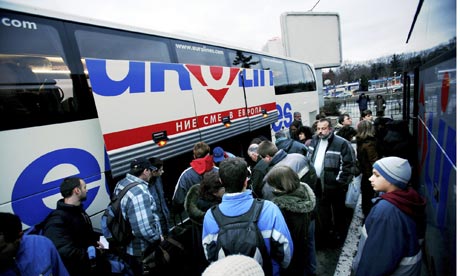
Brexit Buyers’ Remorse? Non, on ne bregrette rien
The vote to leave the EU was an outcome which surprised most commentators, bookies, and even those who voted for the winning side. In the aftermath of the result, John Gray, a popular political theorist, wrote that ‘voters inflicted the biggest shock on the establishment since Churchill was ousted in 1945’. It is hard to think that he is wrong. The only social classes which predominately voted Remain were ABs (affluent and middle-class voters), whereas C1 C2 DE (lower middle-class and working-class) voters all delivered majorities for Leave. As I predicted on this blog in January and contrary to many commentators’ expectations, the referendum engaged more voters than recent general elections. It generated the highest turnout in a UK election …

Post-Brexit wave of hate has laid bare the tensions and divisions in Britain
Following the vote to leave the European Union, there has been a sudden upsurge in racist incidents in Britain. The wave of hate has taken many people by surprise, and has laid bare some of the tensions and divisions eating away at the heart of the United Kingdom. It has also called into question Britain’s claim to be a liberal and inclusive multicultural society, leading to considerable soul searching. A state that has often spoken out against identity politics and prejudice abroad is now facing up to the reality that these issues need to be addressed back home. Predictably and understandably, much of the recent commentary as focussed on the divisive referendum campaign and the fact that the UK voted …

Travelling to the UK? On the Pain, Separation and Dehumanisation of Student Families from ‘High-Risk’ Countries
The violence and despair of the militarised and exclusionary immigration policies of ‘Fortress Europe’ have been well documented. Institutionalised racism combines with an openly hostile bureaucracy of ‘paper walls’. In the UK Home Office, officials are encouraged through a perk system that awards shopping vouchers to officials who decline the highest number of asylum applicants per month. In Fortress Europe: Dispatches from a Gated Continent, Matthew Carr (2012: 120) describes the immigration-media nexus in the UK as a ‘mutually reinforcing consensus between governments, the media and the public that invariably depicts immigration as an endless crisis [and undocumented migrants as] dangerous and dehumanised invaders massing outside the nation’s borders’

How many Bulgarians and Romanians will come to the UK? Estimating migration is hard, but the lifting of restrictions on ‘A2’ nationals is unlikely to have the impact of the 2004 enlargement
On 1 January 2014 British labour markets will be open to Romanian and Bulgarian nationals (the “A2”) as they are to people from the rest of the EU. Many are wondering what the effects will be – although some impacts of Romanian and Bulgarian free movement have already happened, with an estimated 100,000 to 150,000 people born in the A2 currently living in Britain.
Still, the lifting of restrictions creates an expectation of increasing rates of immigration. Over the weekend Eric Pickles claimed to have seen estimates of how many Romanians and Bulgarians might arrive – though he would not reveal what the estimates were – and worried about pressure on the UK’s housing market. Other prominent politicians, including Theresa May and Ed Miliband, have raised concerns that increased migration may reduce wages, especially for the lowest earners.









